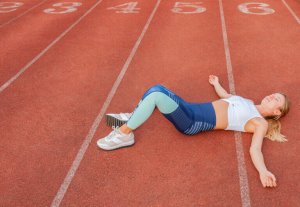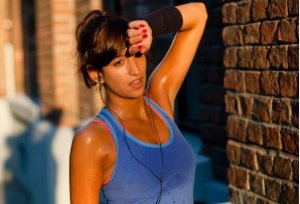Runner's Anemia: Symptoms and Treatment

Anemia is a condition where there’s a decrease in the number of red blood cells. It can have many causes but they’re normally diet-related. Today, we’ll look at a specific type: runner’s anemia.
It’s a relatively common problem for athletes that can cause a drastic drop in performance. The scientific literature lists this problem as quite common in long-distance runners and triathletes.
However, it’s a condition that can be cured, as long as the symptoms are detected and the appropriate treatment is given. So, let’s go into some more detail.
Symptoms of runner’s anemia
As with other types of anemia, one of the main symptoms is fatigue. Tiredness or feeling sleepy for long periods of time can be a signal that something isn’t quite right with your body.
In particular, if you’re a long-distance runner, these sorts of feelings should be more than enough reason to visit your doctor and ask them to check your red blood cell count.
Main causes
If you’re quite a sedentary person, anemia is normally caused by an unbalanced diet, such as a diet low in iron or vitamin B12.
Therefore, it’s always beneficial to make sure that you maintain a varied diet that doesn’t restrict any food groups. That way, you’ll make sure that your body gets all the necessary nutrients to function properly.

However, for long-distance runners, there are other things that can lead to anemia. One of them is your choice of footwear. Inappropriate running shoes can excessively rupture red blood cells as the heel bone strikes the ground.
There may also be dietary causes. Drinking too much coffee or tea before a long run because of their diuretic effects.
Likewise, coffee and tea can interfere with the absorption of iron from your previous meal and it’ll then be lost through your feces. The latest studies carried out on pregnant women confirm this relationship between coffee consumption and the risk of anemia.
The solution to this is to use caffeine supplements. This way, you can still get the benefit from the ergogenic effects on performance without interfering with the absorption of iron.
Varying training intensity
How hard you train can be another determining factor when it comes to runner’s anemia. If you overtrain, you may increase your risk of suffering this and other nutrient deficiencies.
This means that it’s essential to adjust your training intensity to be progressive and thus lower the risk of nutritional problems.
Treatments for runner’s anemia
The best way to prevent runner’s anemia or alleviate the symptoms is to maintain a balanced and varied diet. Make sure you get enough iron by mixing meats and vegetables greatly reduces the chances of your suffering this condition.
Vitamins shouldn’t be overlooked either, especially vitamin B12, which is essential for iron metabolism. Vitamin C is also very important. Iron absorption increases significantly if consumed with a good dose of vitamin C, as current scientific studies show.
So, a varied and balanced diet is recommended which doesn’t restrict any food groups unless you’re told otherwise by a dietician. The only foods that we generally don’t recommend are processed foods.

Conclusion
Runner’s anemia is a relatively common condition that can directly affect your performance. The symptoms are mainly fatigue, and it can be caused by poor diet, and inappropriate training regime, or inadequate sports shoes.
Prevention is always the best option, so stick to a healthy and varied diet. It’s very important to regularly consume foods rich in iron. Both green leafy vegetables and meats are basic components of an athlete’s diet that provide a good dose of iron.
Finally, it’s a good idea to take vitamin C together with iron to maximize absorption, as well as watching your coffee or tea consumption after meals.
Anemia is a condition where there’s a decrease in the number of red blood cells. It can have many causes but they’re normally diet-related. Today, we’ll look at a specific type: runner’s anemia.
It’s a relatively common problem for athletes that can cause a drastic drop in performance. The scientific literature lists this problem as quite common in long-distance runners and triathletes.
However, it’s a condition that can be cured, as long as the symptoms are detected and the appropriate treatment is given. So, let’s go into some more detail.
Symptoms of runner’s anemia
As with other types of anemia, one of the main symptoms is fatigue. Tiredness or feeling sleepy for long periods of time can be a signal that something isn’t quite right with your body.
In particular, if you’re a long-distance runner, these sorts of feelings should be more than enough reason to visit your doctor and ask them to check your red blood cell count.
Main causes
If you’re quite a sedentary person, anemia is normally caused by an unbalanced diet, such as a diet low in iron or vitamin B12.
Therefore, it’s always beneficial to make sure that you maintain a varied diet that doesn’t restrict any food groups. That way, you’ll make sure that your body gets all the necessary nutrients to function properly.

However, for long-distance runners, there are other things that can lead to anemia. One of them is your choice of footwear. Inappropriate running shoes can excessively rupture red blood cells as the heel bone strikes the ground.
There may also be dietary causes. Drinking too much coffee or tea before a long run because of their diuretic effects.
Likewise, coffee and tea can interfere with the absorption of iron from your previous meal and it’ll then be lost through your feces. The latest studies carried out on pregnant women confirm this relationship between coffee consumption and the risk of anemia.
The solution to this is to use caffeine supplements. This way, you can still get the benefit from the ergogenic effects on performance without interfering with the absorption of iron.
Varying training intensity
How hard you train can be another determining factor when it comes to runner’s anemia. If you overtrain, you may increase your risk of suffering this and other nutrient deficiencies.
This means that it’s essential to adjust your training intensity to be progressive and thus lower the risk of nutritional problems.
Treatments for runner’s anemia
The best way to prevent runner’s anemia or alleviate the symptoms is to maintain a balanced and varied diet. Make sure you get enough iron by mixing meats and vegetables greatly reduces the chances of your suffering this condition.
Vitamins shouldn’t be overlooked either, especially vitamin B12, which is essential for iron metabolism. Vitamin C is also very important. Iron absorption increases significantly if consumed with a good dose of vitamin C, as current scientific studies show.
So, a varied and balanced diet is recommended which doesn’t restrict any food groups unless you’re told otherwise by a dietician. The only foods that we generally don’t recommend are processed foods.

Conclusion
Runner’s anemia is a relatively common condition that can directly affect your performance. The symptoms are mainly fatigue, and it can be caused by poor diet, and inappropriate training regime, or inadequate sports shoes.
Prevention is always the best option, so stick to a healthy and varied diet. It’s very important to regularly consume foods rich in iron. Both green leafy vegetables and meats are basic components of an athlete’s diet that provide a good dose of iron.
Finally, it’s a good idea to take vitamin C together with iron to maximize absorption, as well as watching your coffee or tea consumption after meals.
All cited sources were thoroughly reviewed by our team to ensure their quality, reliability, currency, and validity. The bibliography of this article was considered reliable and of academic or scientific accuracy.
- Coates A., Montjoy M., Burr J., Incidence of iron deficiency and iron deficient anemia in elite runners and triathletes. Clin J Sport med, 2017. 27 (5): 493-498.
- Kumera G., Haile K., Abebe N., Marie T., Eshete T., Anemia and its association with coffee consumption and hookworm infection among pregnant women attending antenatal care at debre markos referral hospital, Northwest Ethiopia. PLos One, 2018.
- Bryszewska MA., Comparison study of iron bioaccessibility from dietary supplements and microencapsulated preparations. Nutrients, 2019.
This text is provided for informational purposes only and does not replace consultation with a professional. If in doubt, consult your specialist.








